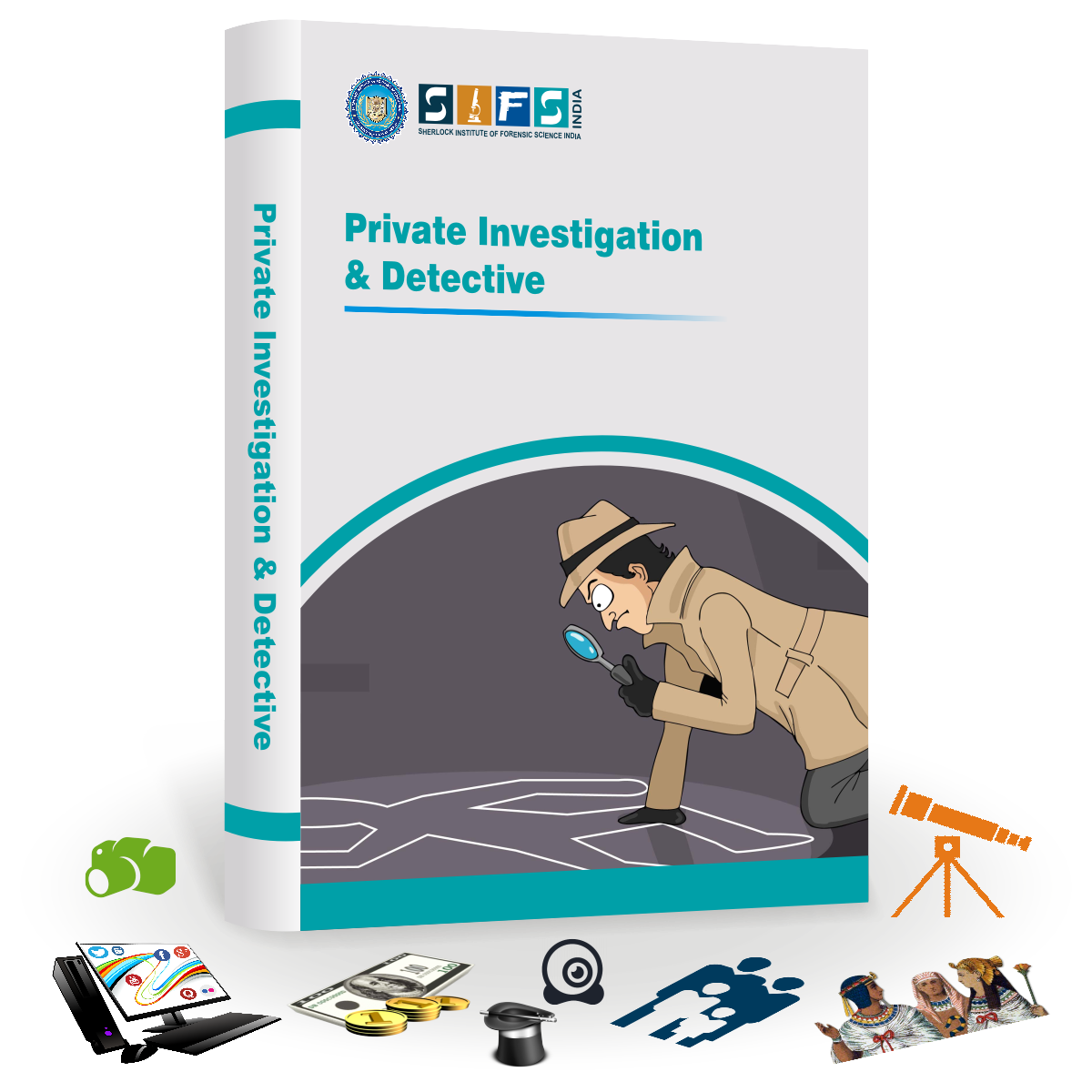MODULE 1 - PRIVATE INVESTIGATION
In this module, you get an overview of private investigation and its history, private investigation as a career, key attributes to become a successful investigator, types of investigations, and differences between police and law enforcement officers and private investigators. The module also covers federal sources of information, private organizations, and agencies that play a role in this profession, along with the need for a strong ethical foundation.
MODULE 2 - DUTIES OF PRIVATE INVESTIGATOR
This module focuses on the principles of investigation and the multifaceted nature of the investigator’s work, covering various areas such as background checks, bounty hunting, bodyguarding, property protection, fingerprinting, and even serving as a witness during legal proceedings. You will also gain insights about the significance of effectively locating sources of information.
MODULE 3 - TOOLS OF INVESTIGATION
This module explores essential techniques and tools used in the investigative process, investigative interviews to gather information from the individuals involved in a case, and locating and reviewing public records. You will also learn skills investigators must possess to explore various other sources of information, like online resources, digital databases, or confidential resources. The concept of investigative photography, which helps you learn techniques to capture visual evidence to support your findings, and the use of the polygraph technique for assessing truthfulness and deception are also covered.
MODULE 4 - INVESTIGATOR AND CLIENT RELATIONSHIP
In this module, you will learn about the investigator-client relationship and the importance of forming a strong working relationship with clients, including individuals, attorneys, corporations, or international entities. A clear understanding of the client’s requirements is crucial before commencing the investigative work, as such work involves dealing with a lot of sensitive and confidential information. So the significance of strong communication skills is taught in this module. No matter with whom you work, you must customize your approach for each client and maintain the highest standards of professionalism to achieve successful outcomes.
MODULE 5 - PRIVACY
This module covers the concept of privacy invasion, different forms of privacy invasion, from physical intrusion to constructive invasions and intrusive investigations, ethical and legal considerations surrounding privacy, public disclosure of private facts, and how to investigate with care and maintain respect for individuals' rights. You will gain insights about the complexities of handling medical records and DNA/genetic records, along with the regulations that govern the handling of such sensitive data during investigations.
MODULE 6 - PRIVILEGES/CONFIDENTIALITY/IMMUNITIES
This module introduces you to confidentiality, privileges, and immunities, highlighting their significance in protecting sensitive information and preserving individual rights. You will learn about various types of privileges, such as attorney-client privilege, marital privilege, doctor-patient privilege, clergy privilege, self-incrimination privilege, litigation privilege, and the concept of privilege waiver.
The module also explores types of immunities like spousal immunity, parental immunity, and governmental immunity, highlighting the legal safeguards and exemptions that can influence investigations. By the end of this module, you will be equipped with the knowledge to handle complex situations by adhering to the existing rules and laws.
MODULE 7 - INTERVIEWING AND INTERROGATION
This module covers an in-depth overview of the art of interviewing and interrogation as an investigator. It begins with the concept of interviewing, including objectives, principles, and types of interviewing; the importance of adequate preparation and effective questioning techniques, the initial contact with interviewees, and rapport-building methods as per interviewees’ attitudes.
You will then be introduced to the process of interrogation, covering its purpose, attitudes, and approaches. You will learn how to deal with deceptive responses with practical suggestions and tips for honing these skills and being able to extract essential information while respecting legal and ethical boundaries.
MODULE 8 - NOTE TAKING AND REPORT WRITING
In this module, you will learn the importance of effective note-taking and report writing in the investigative process, the purpose behind taking notes, guidelines and suggestions for taking meaningful and accurate notes, different types of statements (admissions, confessions, depositions, and written), methods of note-taking in different investigative scenarios, guidelines to produce high-quality reports to support legal proceedings, and the need for clear communication and documentation.
MODULE 9 - LEGAL INVESTIGATION
This module covers the legal and constitutional aspects relevant to the field of private investigation, the structure of the constitution, the concept of habeas corpus, the role and responsibilities of a legal investigator, types of licenses, including license reinstatement, requirements for training and testing for preparing investigators for their roles, and standards of practice and prohibited acts to maintain ethical conduct.
The module also explores legal issues like aiding and abetting, restrictions on the use of polygraph tests, witness tampering, trespassing, defamation (slander or libel), and elements related to arrests conducted by private investigators, providing an in-depth understanding of the legal framework within which investigators operate.
MODULE 10 - POWER OF ARREST
In this module, you will gain insights about the intersection of private investigation with law enforcement and the legal boundaries of investigator searches. The module begins with the role and considerations surrounding off-duty law enforcement personnel engaged in private investigations, searches conducted by investigators and their limitations, and how investigators can operate within the legal framework and collaborate with law enforcement bodies when required.
MODULE 11 - GUIDELINES FOR PRETEXT INVESTIGATION
This module explores the ethical and legal aspects of investigative techniques used by attorneys and their agents, particularly focusing on the use of pretext, the importance of adhering to American Bar Association (ABA) rules, legal and illegal pretext, the boundaries and responsibilities of legal professionals, and methods to carry out investigations following ethical standards and legal regulations.
MODULE 12 - INSURANCE AND ARSON INVESTIGATIONS
This module covers different investigative scenarios, including fraudulent disability investigations, motor vehicle accident investigations and hit-and-run cases, railroad crossing investigations, premise accidents investigations, suicide investigations, and fires and explosions. The module concludes with the concept of accident reconstruction to highlight the truthfulness of the crash while making insurance claims.
MODULE 13 - CIVIL INVESTIGATIONS
In this module, you will learn about civil laws, various facets of defense against tort actions, highlighting the importance of a well-informed investigative process in legal proceedings, liquor liability investigations (involving cases of damage by intoxicated persons), professional malpractice investigations (investigating wrongdoing by professionals or businesses that caused damage), and product liability investigations (investigative methods employed to assess the safety and liability of consumer products).
MODULE 14 - CRIMINAL INVESTIGATION
This module covers the intricacies of criminal investigation, the role and responsibilities of investigators within the context of criminal law, the principles of criminal investigation, aspects of burden of proof and presumptions, criminal defence investigation, highlighting the role investigators play in ensuring a fair trial for the accused, fundamental principles of evidence focusing on how evidence is collected, evaluated, and presented in criminal proceedings, and evidence preservation and its forensic significance.
MODULE 15 - BACKGROUND INVESTIGATIONS
This module focuses on various background checks to ensure the safety, security, and reliability of individuals and entities and the significance of these checks in different scenarios.
Types of background checks include:
Assets background checks - Checks involving property, financial transactions, vehicles, etc.)
Business partner background checks - Checks to authenticate the genuineness of the business partner.
Pre-employment background checks - Checks involve authenticating the reliability of the candidate to help companies make the right hiring decisions.
Mate checks - Checks prior to marriage to know about the financial, employment, and criminal history of the future partner.
Self-defence background checks - Checks to authenticate your reliability with no past involvement in any criminal or illegal activities.
Witness and jury background checks - Checks involving gathering information about individuals who might serve as witnesses during a legal proceeding.
This module will equip you with the knowledge and tools necessary to make informed decisions and ensure security.
MODULE 16 - FINDING MISSING PERSONS
In this module, you will be introduced to locating missing persons, the importance of a preliminary interview with the client, the need to gather relevant information, skip tracing to locate intentionally (individuals who have voluntarily disappeared due to any reason) or unintentionally (individuals who have gone missing due to circumstances beyond their control) missing persons, adoption (to trace the history of an individual’s biological parents), and genealogy (study of family history and relationships using techniques like DNA analysis) searches.
MODULE 17 - COMMERCIAL THEFT INVESTIGATIONS
This module focuses on commercial theft investigations, including employee theft (taking money, time, and goods from the workplace with the intention of personal gain), shoplifters and their classification, methods of shoplifting, the significance and principles of retail theft investigations, ways to recognize shoplifters to identify potential threats, and shoplifting preventive strategies.
MODULE 18 - DOMESTIC INVESTIGATIONS AND COURT TESTIMONY
This module covers the principles and significance of domestic violence, the techniques and responsibilities of investigators, matters involving child custody disputes and ethical considerations associated with such cases, fidelity investigations, which involve marital disputes over suspected cheating by the partner, and the importance of court testimony, highlighting the role of investigators in presenting their findings and expertise in legal proceedings related to domestic matters.
MODULE 19 - COMPUTER CRIME INVESTIGATION
In this module, you will learn about the multifaceted domains of computer abuse investigation, including telecommunication crimes and internet-related offences, role of a criminal investigator in uncovering digital misdeeds, the reason behind investigating cyber crimes, the investigative process, including key elements, investigative theories, and foundational principles like the rules of evidence, rules of exclusion, and the significance of physical evidence.
The module also covers various investigation methods, the importance of narrowing down suspects and utilizing informants, the collaborative roles of law enforcement and government agencies in combating cybercrimes, and the limitations investigators face while handling these complex cases.
MODULE 20 - SURVEILLANCE
This module covers the fundamentals of surveillance techniques, principles of general surveillance, various surveillance methods like foot surveillance, fixed surveillance, common carrier surveillance, vehicle surveillance (both single and two-vehicle surveillance), moving surveillance, and the use of tracking devices and video surveillance. You will also learn about valuable tips to enhance surveillance efficacy and exemptions from surveillance practices, such as those applicable to the media, spouses, parents, and law enforcement.
MODULE 21 - SETTING UP BUSINESS AND MARKETING
In this module, you will learn about how to establish a successful investigative business, covering its various aspects like the types of investigative services, developing a comprehensive business plan, and addressing key considerations such as location, start-up costs estimation, naming the company, staffing, acquiring necessary investigative equipment, setting hourly rates, determining investigative fees, handling credit applications, establishing a business bank account, exploring alternative financial resources, and working with accountants.
The module also focuses on crucial aspects of insurance requirements and bonding, the need for strategic marketing planning, market potential assessment, one-on-one marketing, advertising, and promotional strategies, including tips for leveraging print and online media effectively.






